HND Business Strategy, Level 5: Task 1 Strategic Planning Report
VerifiedAdded on 2023/03/24
|9
|928
|86
Report
AI Summary
This report presents an analysis of business strategy, focusing on Task 1 of a Level 5 HND Business course. It begins by evaluating the core components of strategic planning, including business missions, visions, objectives, and core competencies. The report then delves into the factors essential for formulating strategic plans, such as market environment analysis, competitor analysis, budget allocation, and stakeholder analysis. The evaluation also includes the effectiveness of various techniques used in strategic planning, like the BCG matrix. The report utilizes examples from the retail fashion industry to illustrate these concepts, emphasizing the importance of strategic decisions in achieving business objectives and adapting to the competitive market. The report also includes references for further reading.
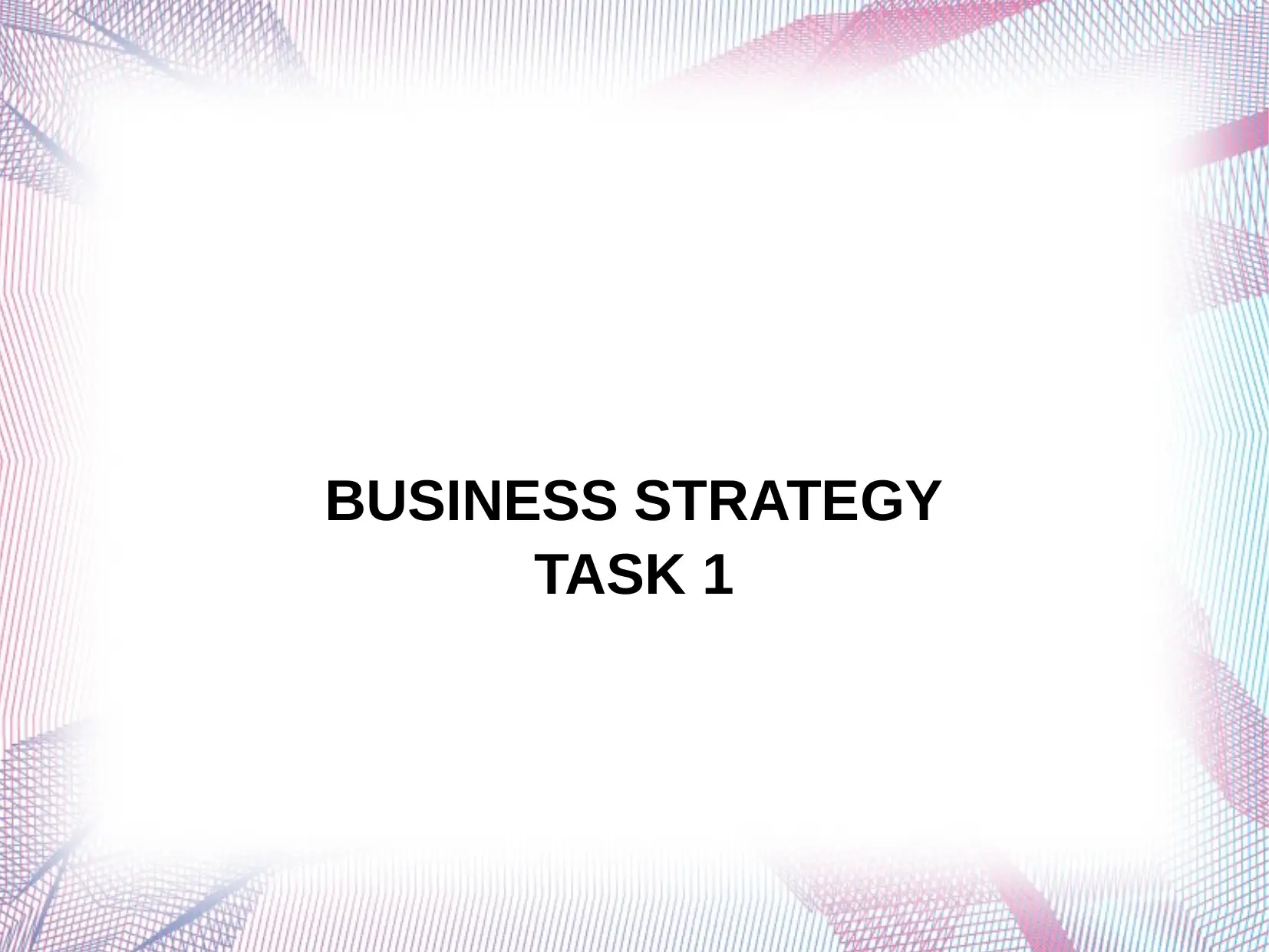
BUSINESS STRATEGY
TASK 1
TASK 1
Paraphrase This Document
Need a fresh take? Get an instant paraphrase of this document with our AI Paraphraser
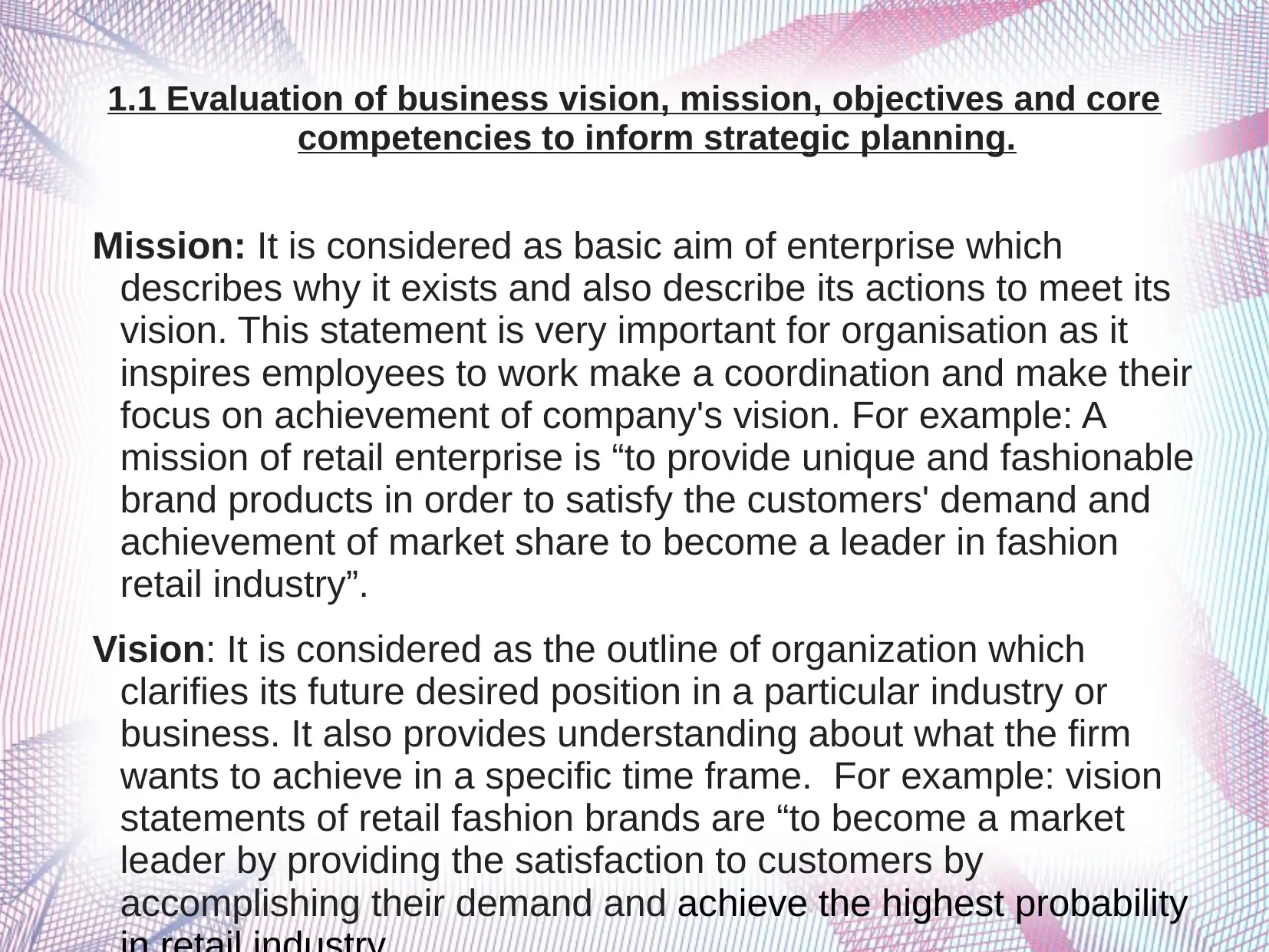
1.1 Evaluation of business vision, mission, objectives and core
competencies to inform strategic planning.
Mission: It is considered as basic aim of enterprise which
describes why it exists and also describe its actions to meet its
vision. This statement is very important for organisation as it
inspires employees to work make a coordination and make their
focus on achievement of company's vision. For example: A
mission of retail enterprise is “to provide unique and fashionable
brand products in order to satisfy the customers' demand and
achievement of market share to become a leader in fashion
retail industry”.
Vision: It is considered as the outline of organization which
clarifies its future desired position in a particular industry or
business. It also provides understanding about what the firm
wants to achieve in a specific time frame. For example: vision
statements of retail fashion brands are “to become a market
leader by providing the satisfaction to customers by
accomplishing their demand and achieve the highest probability
competencies to inform strategic planning.
Mission: It is considered as basic aim of enterprise which
describes why it exists and also describe its actions to meet its
vision. This statement is very important for organisation as it
inspires employees to work make a coordination and make their
focus on achievement of company's vision. For example: A
mission of retail enterprise is “to provide unique and fashionable
brand products in order to satisfy the customers' demand and
achievement of market share to become a leader in fashion
retail industry”.
Vision: It is considered as the outline of organization which
clarifies its future desired position in a particular industry or
business. It also provides understanding about what the firm
wants to achieve in a specific time frame. For example: vision
statements of retail fashion brands are “to become a market
leader by providing the satisfaction to customers by
accomplishing their demand and achieve the highest probability
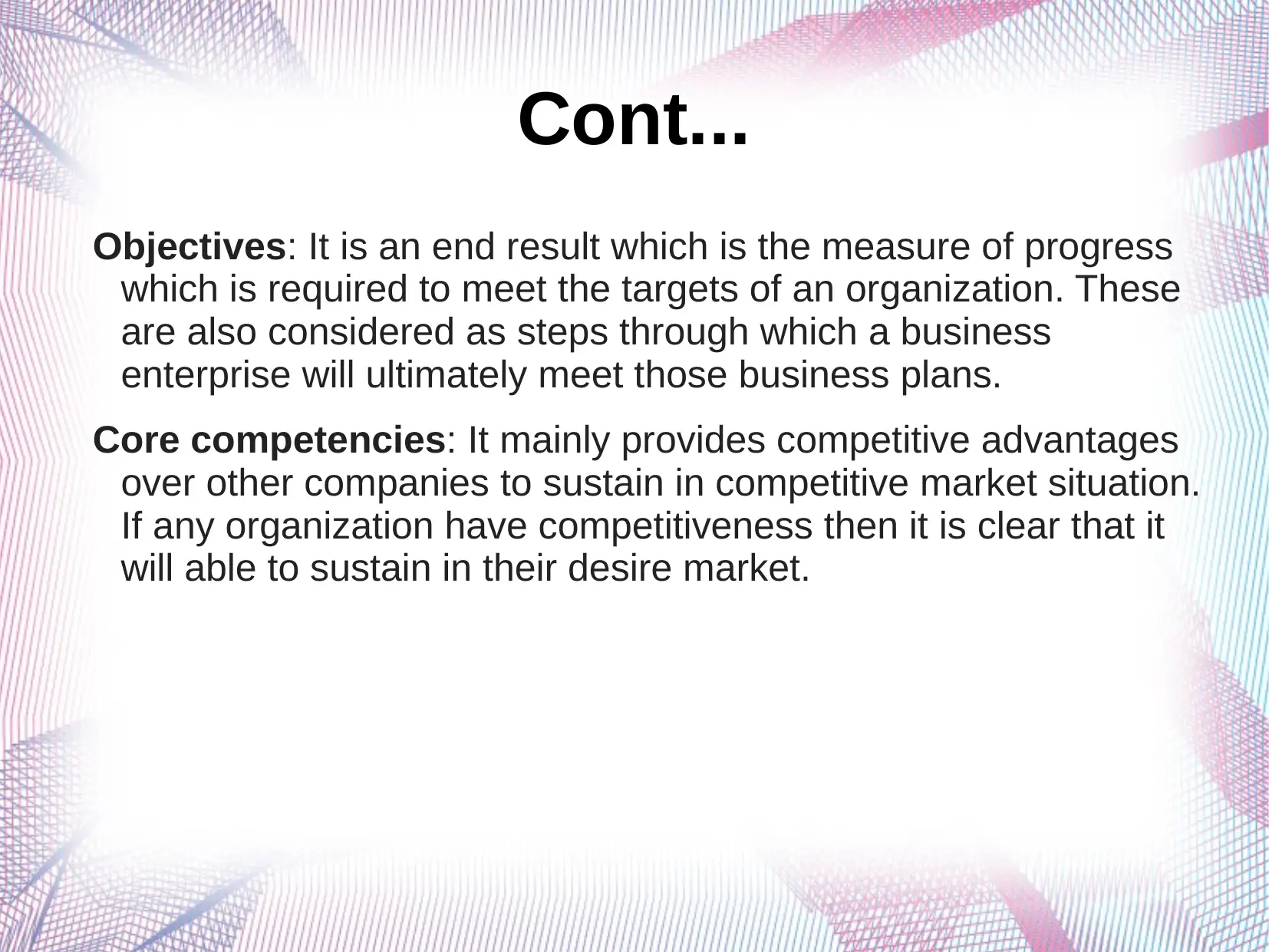
Cont...
Objectives: It is an end result which is the measure of progress
which is required to meet the targets of an organization. These
are also considered as steps through which a business
enterprise will ultimately meet those business plans.
Core competencies: It mainly provides competitive advantages
over other companies to sustain in competitive market situation.
If any organization have competitiveness then it is clear that it
will able to sustain in their desire market.
Objectives: It is an end result which is the measure of progress
which is required to meet the targets of an organization. These
are also considered as steps through which a business
enterprise will ultimately meet those business plans.
Core competencies: It mainly provides competitive advantages
over other companies to sustain in competitive market situation.
If any organization have competitiveness then it is clear that it
will able to sustain in their desire market.
⊘ This is a preview!⊘
Do you want full access?
Subscribe today to unlock all pages.

Trusted by 1+ million students worldwide
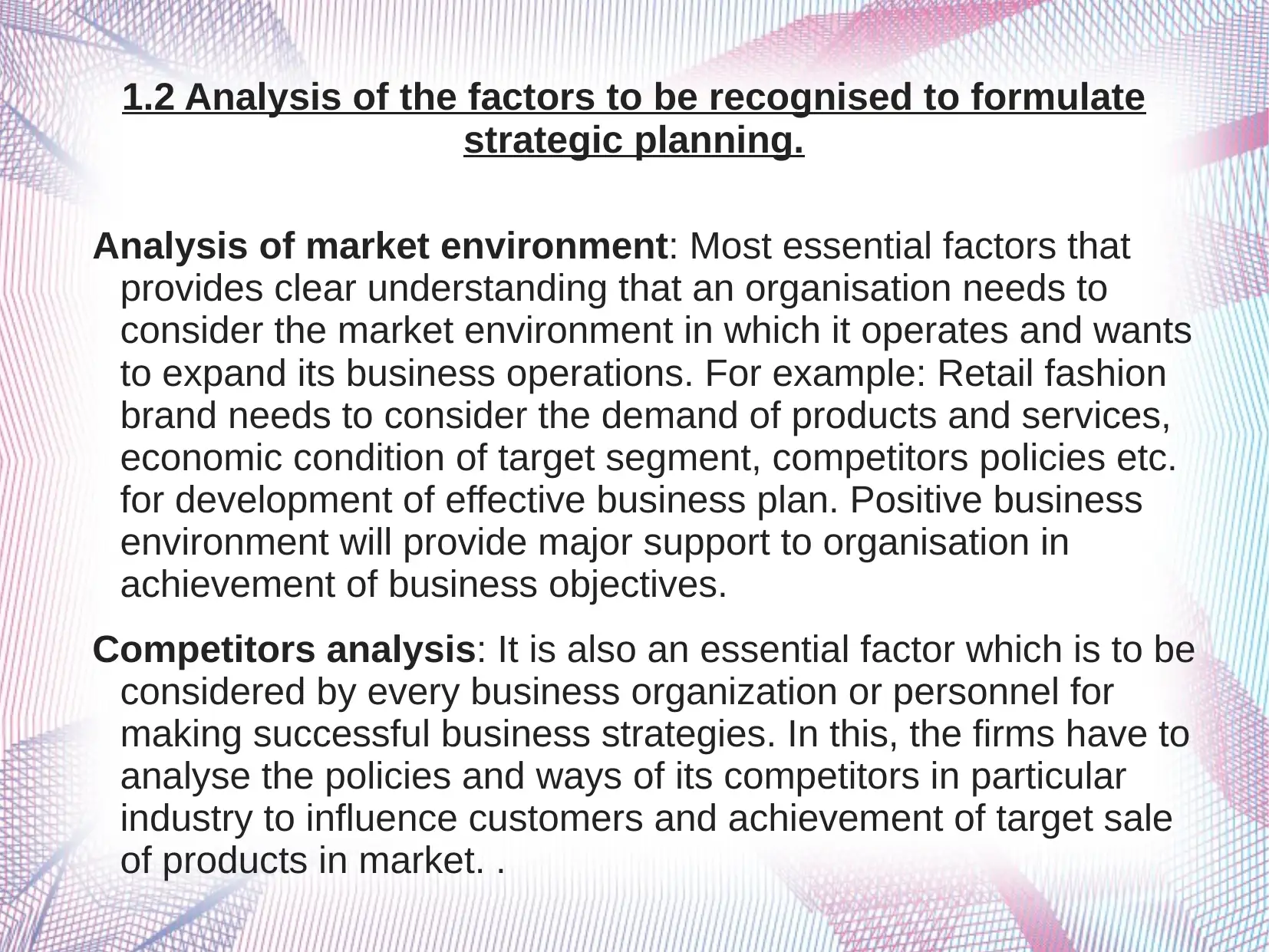
1.2 Analysis of the factors to be recognised to formulate
strategic planning.
Analysis of market environment: Most essential factors that
provides clear understanding that an organisation needs to
consider the market environment in which it operates and wants
to expand its business operations. For example: Retail fashion
brand needs to consider the demand of products and services,
economic condition of target segment, competitors policies etc.
for development of effective business plan. Positive business
environment will provide major support to organisation in
achievement of business objectives.
Competitors analysis: It is also an essential factor which is to be
considered by every business organization or personnel for
making successful business strategies. In this, the firms have to
analyse the policies and ways of its competitors in particular
industry to influence customers and achievement of target sale
of products in market. .
strategic planning.
Analysis of market environment: Most essential factors that
provides clear understanding that an organisation needs to
consider the market environment in which it operates and wants
to expand its business operations. For example: Retail fashion
brand needs to consider the demand of products and services,
economic condition of target segment, competitors policies etc.
for development of effective business plan. Positive business
environment will provide major support to organisation in
achievement of business objectives.
Competitors analysis: It is also an essential factor which is to be
considered by every business organization or personnel for
making successful business strategies. In this, the firms have to
analyse the policies and ways of its competitors in particular
industry to influence customers and achievement of target sale
of products in market. .
Paraphrase This Document
Need a fresh take? Get an instant paraphrase of this document with our AI Paraphraser
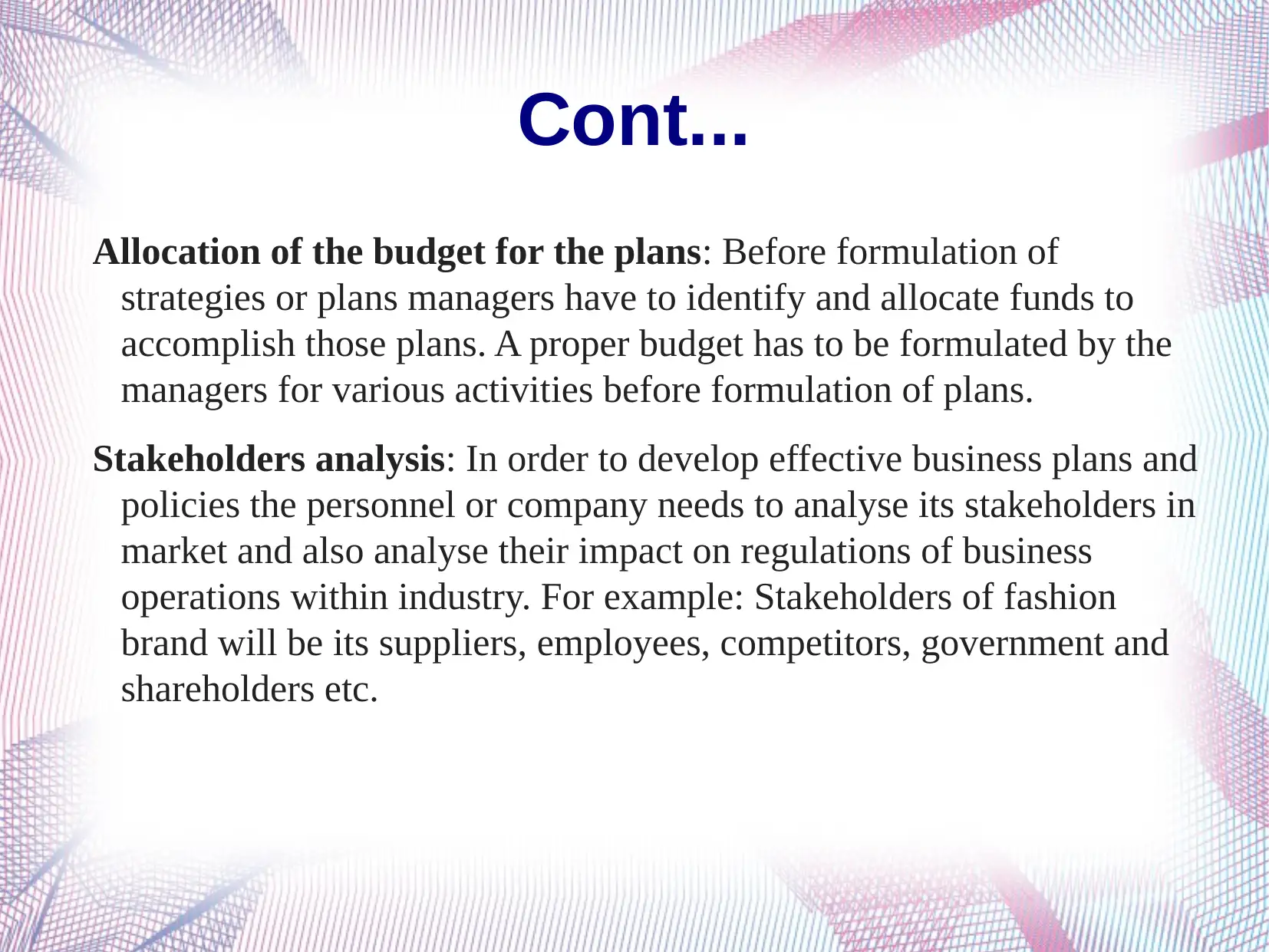
Cont...
Allocation of the budget for the plans: Before formulation of
strategies or plans managers have to identify and allocate funds to
accomplish those plans. A proper budget has to be formulated by the
managers for various activities before formulation of plans.
Stakeholders analysis: In order to develop effective business plans and
policies the personnel or company needs to analyse its stakeholders in
market and also analyse their impact on regulations of business
operations within industry. For example: Stakeholders of fashion
brand will be its suppliers, employees, competitors, government and
shareholders etc.
Allocation of the budget for the plans: Before formulation of
strategies or plans managers have to identify and allocate funds to
accomplish those plans. A proper budget has to be formulated by the
managers for various activities before formulation of plans.
Stakeholders analysis: In order to develop effective business plans and
policies the personnel or company needs to analyse its stakeholders in
market and also analyse their impact on regulations of business
operations within industry. For example: Stakeholders of fashion
brand will be its suppliers, employees, competitors, government and
shareholders etc.
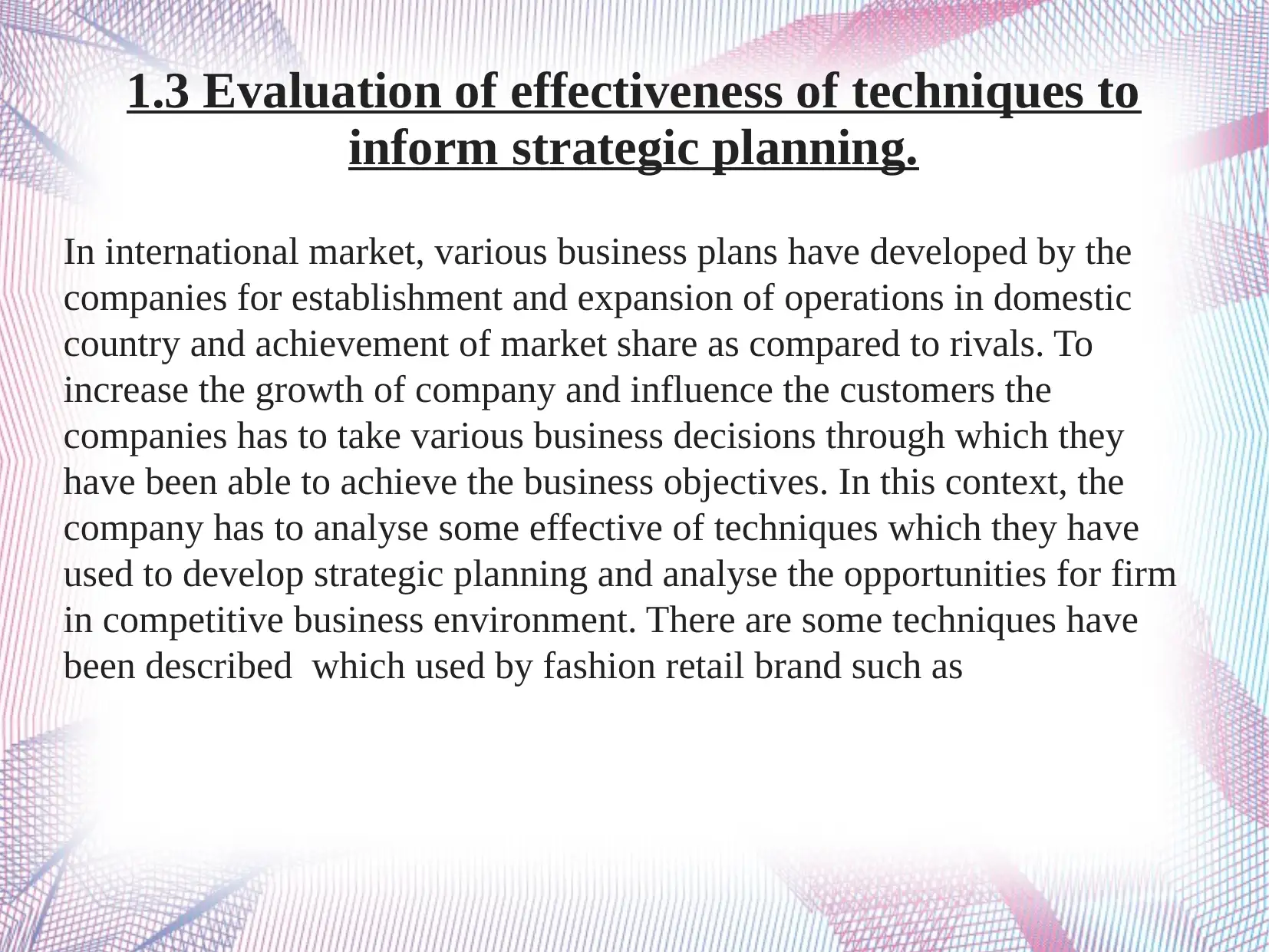
1.3 Evaluation of effectiveness of techniques to
inform strategic planning.
In international market, various business plans have developed by the
companies for establishment and expansion of operations in domestic
country and achievement of market share as compared to rivals. To
increase the growth of company and influence the customers the
companies has to take various business decisions through which they
have been able to achieve the business objectives. In this context, the
company has to analyse some effective of techniques which they have
used to develop strategic planning and analyse the opportunities for firm
in competitive business environment. There are some techniques have
been described which used by fashion retail brand such as
inform strategic planning.
In international market, various business plans have developed by the
companies for establishment and expansion of operations in domestic
country and achievement of market share as compared to rivals. To
increase the growth of company and influence the customers the
companies has to take various business decisions through which they
have been able to achieve the business objectives. In this context, the
company has to analyse some effective of techniques which they have
used to develop strategic planning and analyse the opportunities for firm
in competitive business environment. There are some techniques have
been described which used by fashion retail brand such as
⊘ This is a preview!⊘
Do you want full access?
Subscribe today to unlock all pages.

Trusted by 1+ million students worldwide
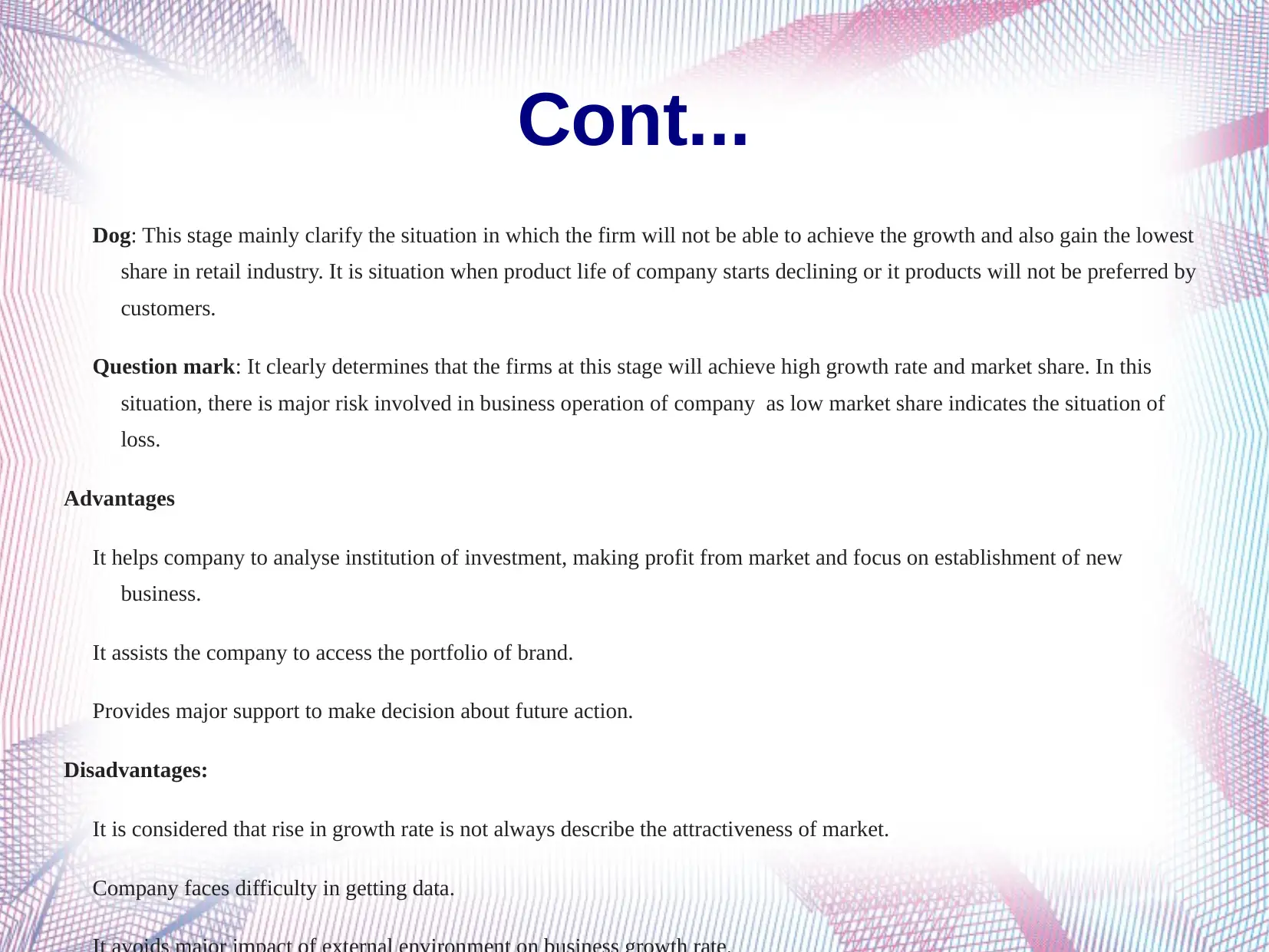
Cont...
Dog: This stage mainly clarify the situation in which the firm will not be able to achieve the growth and also gain the lowest
share in retail industry. It is situation when product life of company starts declining or it products will not be preferred by
customers.
Question mark: It clearly determines that the firms at this stage will achieve high growth rate and market share. In this
situation, there is major risk involved in business operation of company as low market share indicates the situation of
loss.
Advantages
It helps company to analyse institution of investment, making profit from market and focus on establishment of new
business.
It assists the company to access the portfolio of brand.
Provides major support to make decision about future action.
Disadvantages:
It is considered that rise in growth rate is not always describe the attractiveness of market.
Company faces difficulty in getting data.
Dog: This stage mainly clarify the situation in which the firm will not be able to achieve the growth and also gain the lowest
share in retail industry. It is situation when product life of company starts declining or it products will not be preferred by
customers.
Question mark: It clearly determines that the firms at this stage will achieve high growth rate and market share. In this
situation, there is major risk involved in business operation of company as low market share indicates the situation of
loss.
Advantages
It helps company to analyse institution of investment, making profit from market and focus on establishment of new
business.
It assists the company to access the portfolio of brand.
Provides major support to make decision about future action.
Disadvantages:
It is considered that rise in growth rate is not always describe the attractiveness of market.
Company faces difficulty in getting data.
Paraphrase This Document
Need a fresh take? Get an instant paraphrase of this document with our AI Paraphraser
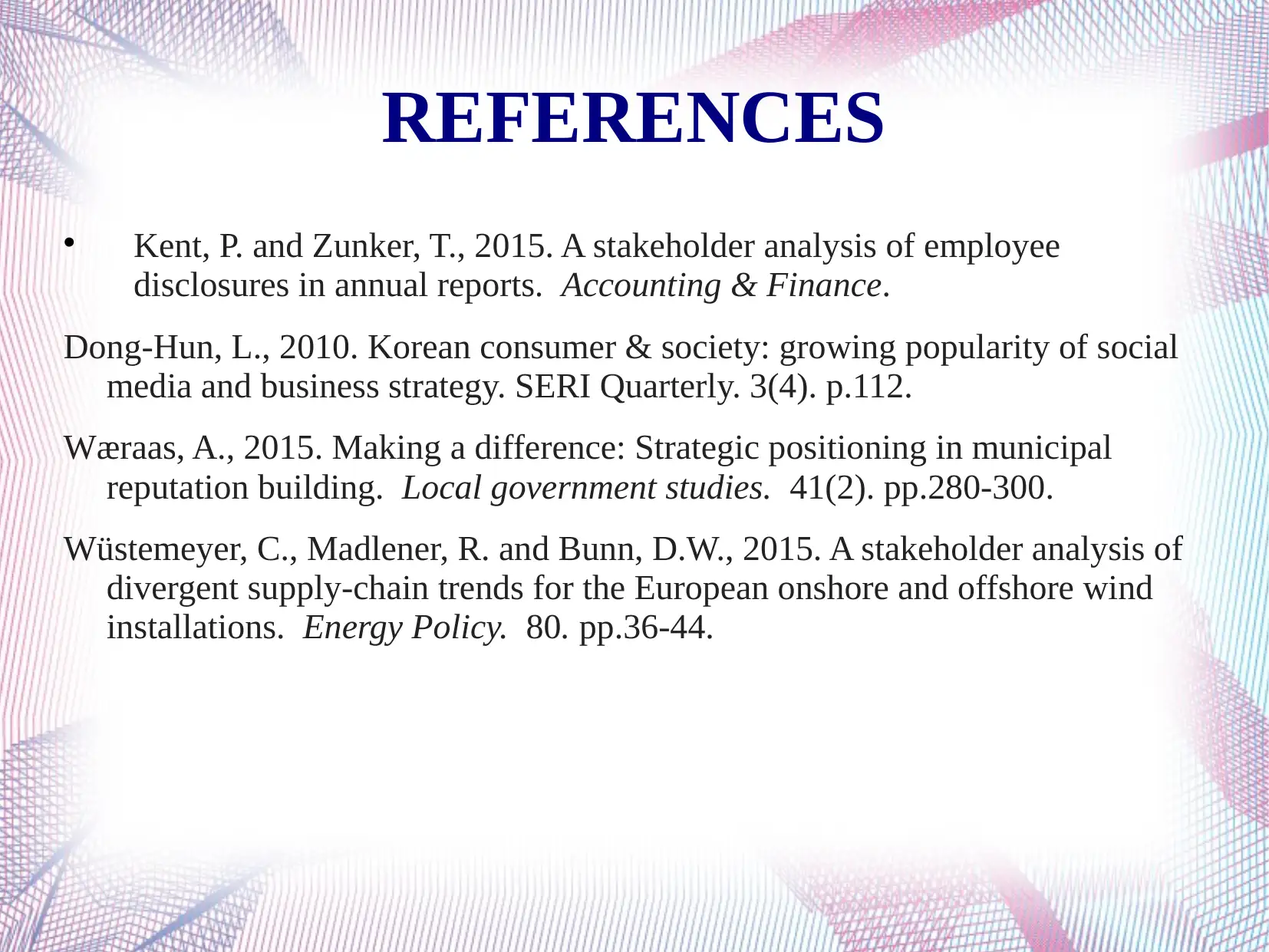
REFERENCES
Kent, P. and Zunker, T., 2015. A stakeholder analysis of employee
disclosures in annual reports. Accounting & Finance.
Dong-Hun, L., 2010. Korean consumer & society: growing popularity of social
media and business strategy. SERI Quarterly. 3(4). p.112.
Wæraas, A., 2015. Making a difference: Strategic positioning in municipal
reputation building. Local government studies. 41(2). pp.280-300.
Wüstemeyer, C., Madlener, R. and Bunn, D.W., 2015. A stakeholder analysis of
divergent supply-chain trends for the European onshore and offshore wind
installations. Energy Policy. 80. pp.36-44.
Kent, P. and Zunker, T., 2015. A stakeholder analysis of employee
disclosures in annual reports. Accounting & Finance.
Dong-Hun, L., 2010. Korean consumer & society: growing popularity of social
media and business strategy. SERI Quarterly. 3(4). p.112.
Wæraas, A., 2015. Making a difference: Strategic positioning in municipal
reputation building. Local government studies. 41(2). pp.280-300.
Wüstemeyer, C., Madlener, R. and Bunn, D.W., 2015. A stakeholder analysis of
divergent supply-chain trends for the European onshore and offshore wind
installations. Energy Policy. 80. pp.36-44.

Thank You
⊘ This is a preview!⊘
Do you want full access?
Subscribe today to unlock all pages.

Trusted by 1+ million students worldwide
1 out of 9
Related Documents
Your All-in-One AI-Powered Toolkit for Academic Success.
+13062052269
info@desklib.com
Available 24*7 on WhatsApp / Email
![[object Object]](/_next/static/media/star-bottom.7253800d.svg)
Unlock your academic potential
Copyright © 2020–2026 A2Z Services. All Rights Reserved. Developed and managed by ZUCOL.





